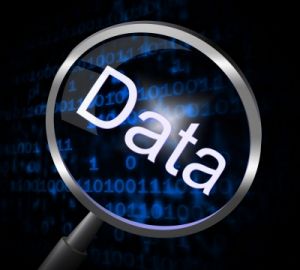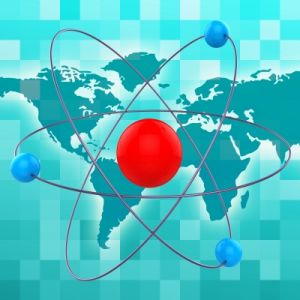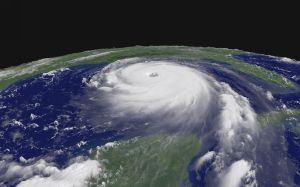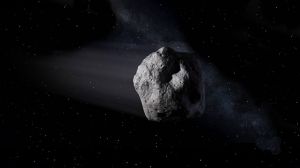Scientific Data and Intelligence (Understanding Ourselves)
One of the key themes in Life and Earth is that our interpretations of the physical universe, and our ensuing decisions, are key to ensuring a bright future for Life and Earth. Ultimately, there is only one measure of our interpretations and choices, and that is in their consequences. As suggested, the use of science as a way of interpreting the physical world, is critical in dealing with the future problems we will face, related to our technologies. In a sense, science is the most realistic "common language" that we have, given that we all live within laws of science, like gravity, every day.
In order to use science and accurately interpret the physical world, we must have accurate data, and make it accessible to all. After all, how can we get on the same page if we have conflicting or inaccurate data about the physical world around us. For example, countries may disagree on the impact of humans on climate change if they have different and conflicting data. In order to become as intelligent as possible about our future we must use and have access to accurate scientific data.

a) Intelligent decisions require accurate scientific data
In the context of this book, I refer to intelligence as the quality of human beings that enables us to interpret the world so that the decisions we make will allow Life and Earth to endure. Not only does it mean that we must endure as long as possible, but it also means that we must maintain the qualities of Life and Earth that give us reason to appreciate living. How do we find the intelligence to make this all possible? I have talked a great deal about having accurate and relevant data in the section Science, Probabilities, and Beliefs. Although it may not be the only important factor in being intelligent, data that is accurate, meaningful, and reliable is a basic requirement in order to make intelligent choices.
If we make our choices, and we rely on bad data, then we pay the consequences. For example, if we plan on buying a used car and we simply take the word of the seller at face value, we open ourselves to the possibility of bad consequences. Sometimes we are just lucky, but in the end, the odds catch up to us. Ultimately, we find that accurate and relevant data are both critical in order to ensure the consequences that we desire. If we do our research, sometimes referred to as due diligence, then the probability increases that our choices will give us the results we desire. We must accept that we are responsible for choosing to rely on useful and accurate data, or whether we choose to take our chances without the support of relevant data.
Because of our technology, human beings are able to now have a greater impact on Life, the Earth, and the future. As we move forward, our decisions on how we handle nuclear weapons, artificial intelligence, biological research, and so on, will impact our future in ways we have never experienced. We must have accurate and useful data in order to make decisions related to our technologies. If we move forward and we have inaccurate data, or we ignore the data for whatever reason, we will be as vulnerable as the person who would buy a used car simply based on the seller's word. Whether we are a carpenter selecting the best wood to make a chair, or a world leader attempting to negotiate with another country, in order to make choices that will take us to where we want to be, we must have available to us, both accurate and relevant data.

With all due respect for our beliefs reflected in our religions, our egos, our morals, personal interests, and so on, I must again make reference to the physical universe that we are a part of. If we do not show respect for the laws of matter and energy then we are more likely to make decisions that place the physical existence of Life and Earth at risk. If we do not show respect for science, then we cannot expect to dodge the implications related to the side effects of our technologies. It is important to note that I refer to data regarding science, and not data related to other disciplines such as religions, our imaginations, and other non-scientific beliefs systems. These beliefs also warrant detailed consideration but I refer specifically to scientific data related to the physical universe of matter and energy.
As an example, the new administration of the United States of America in 2017 decided to exit the Paris Climate Agreement where all countries attempt to deal with the impact of climate change. I cannot say whether this decision is correct or not, but clearly it is an example where the countries of the world are faced with a technological side effect that may warrant a greater understanding of climate science. Specifically, we need even more data on whether humans are a significant cause of climate change, and if so, how much we are impacting the planet from our activities? Such data, and the decisions or lack of decisions that follow, affect us on a global scale. The world needs a better method to understand problems such as climate change, or Life and Earth may not survive. We need a way to interpret the physical universe around us accurately. We must make this a priority that supersedes our cultural belief systems and economic interests.
So how do we go about establishing a system to gather data that will enable us to be intelligent, and interpret the physical universe accurately? In previous sections I categorized our beliefs as scientific beliefs and non-scientific beliefs. This leads to one of the primary recommendations I have made in the section "My Memorandum to Life and Earth". I believe the countries of the world should establish two organizations, not so different from the United Nations, or possibly divisions of the United Nations, which would combine the best minds of the world from all countries. These two organizations would provide intelligent and unbiased recommendations to world decision-makers on both scientific and non-scientific issues. Each organization would include representatives of countries that might wish to contribute. They would be the think tanks that could help to deal with, and confront, issues related to both science and philosophy.
b) Intelligent decisions require accessibility to accurate scientific data

It is one thing to have accurate data, but if it is not available, it does none of us any good. It was only a few centuries ago that world populations were spread all over different continents with no way of communicating. They could not even exchange information between cities and towns, never mind between continents. Even at that time it was a big development for towns to establish postal systems where mail could be transferred between them by a postman who made the trek on horseback.
Today things are very different. We have established the internet which has become available globally, to almost everyone. It is hard to fathom that someone on the opposite side of the world can simply type a message, or make a video, and send it to someone else on the other side of the planet in seconds. In fact, our ability to communicate has come to the point where we can send signals and images between planets such as from satellites, or robotic vehicles on Mars to Earth.
Given that our ability to communicate and share information has improved significantly, it only makes sense to combine all our knowledge and place it in a type of world library. What better place for the library than the internet. The internet is a resource that individuals, cultures, and countries can immediately access. I think it is important to appreciate how significant it is that accurate and relevant data can be provided in such a place, accessible to all. It would be a huge achievement in bringing the minds of the human species together, and a means for us to learn from each other and plan for the future of Life and Earth.
Just imagine how a complete knowledge database for all levels, from grade one to university, could be offered as part of a world data bank to individuals and schools worldwide. This might be especially useful if it provided accurate information in areas such as biology, chemistry, mathematics, astronomy, and physics, given that these subjects deal with the common language of science that we all must deal with as we attempt to survive in the physical universe.

This might ensure that a greater percentage of the world population had a better understanding of how technological side effects like climate change and nuclear proliferation can affect us all.
One might argue that not everyone on this planet needs to be intelligent about science. Why does everyone need to be educated on the flow of matter and energy, and the nature of the physical world that we are all a part of? There is some truth to this, but given that much of the world works on the premise of "one person one vote" it means that each individual's interpretations of the world, and decisions, are treated equally. Sometimes we hope we can delegate the task to our leaders who get voted into power, but theoretically, at least in democratic systems, they gain power because of those who voted them in. One must be willing to accept that our leaders are a reflection of our intelligence. Ultimately, the consequences of their actions can only be traced to those that allowed them to be in power. The consequences of the decisions of our world leaders are also our responsibility.
What I am suggesting is that if leaders make bad decisions based on their inaccurate interpretations of reality, especially regarding the negative impact of our technologies on such things as climate change, then their decisions are merely a reflection of our own inaccurate interpretations. We are responsible for being intelligent and ensuring that our children are intelligent. I make this point in order to highlight how important it is that we have access to accurate scientific data about the physical universe, accessible to all. Even if our leaders do not reflect our beliefs, it is still our responsibility to have the knowledge, intelligence, and the will, to question their decisions if we feel it is warranted.
c) Intelligent decisions require us to value and apply accurate scientific data

I have discussed the two obvious requirements in order to make accurate interpretations of the physical world. Basically, we require accurate data regarding the physical universe, and accessibility to the data. A simple example would be if a hurricane were headed toward your home. If you have inaccurate data, you might not be sure the hurricane is coming your way. If the data is accurate, but not accessible to you, it does not do you much good either.
Let us assume that the data regarding a hurricane coming your way is accurate, and it is accessible to you. Even though you know the data you get is accurate, this does not guarantee that you will make a specific decision. Most would assume the "right" choice would be to leave in order to survive. In most cases you would find animals leaving the area to survive, but there are other reasons that humans might do otherwise.
The fact is, that an individual, culture, or country, may simply not want to make decisions based on clearly accurate and accessible data. Such reasons for ignoring the data might include religious beliefs, our imagination, our ego, or other beliefs not related to science and the physical universe. Even when accurate data is available for making a decision, some might choose to overlook the probable scientific consequences of a decision. This of course places the existence of themselves and others at greater risk in the physical universe.
In order to express this more clearly, I will use the example of an asteroid about to hit a planet. This is a variation of an example I used earlier in the book. Assume there are four planets that face a cosmic event that may destroy their planets.

Planet A is comprised almost entirely of inhabitants that follow the laws of science. They have created instruments such as telescopes to monitor the cosmos, and they have developed energy that allows them to propel themselves and objects through space. With their instruments, it becomes clear that there is a massive asteroid heading to their planet and they will surely be destroyed. The inhabitants consider two alternatives. They are to try to change the trajectory of the asteroid, or if that is not possible, they have made preparations to move their inhabitants through space to another nearby planet that is habitable and will be unaffected. How they do it is not important. All that matters is that they were able to acquire accurate data regarding the asteroid, that those who make the decisions had access to the data, and that they chose to act on the data to survive, which was the consequence they desired.
Planet B is very similar to Planet A. The inhabitants are well versed in the laws of science and they have created the ability of space travel so that they can colonize a nearby planet that they have studied. Like Planet A, relying on their scientific data, they make preparations and leave before the asteroid imminently destroys their planet. Unlike Planet A though, they also recognize the value of diversity when it comes to survival. Instead of all inhabitants leaving, they also construct a fail-safe plan. They create safe areas underground where some inhabitants can stay even when the asteroid hits. Those that stay are aware that the scientific probability of them surviving, is very low.
As the collision date arrives, it appears that the scientific calculations did not account for all variables, and there is only minor damage to Planet B. Those that were underground come to the surface only to find that it has been virtually unchanged. They have survived. At the same time, they find that those who had left to the new planet had found that they are unable to return, that the destined planet was not habitable, and that they had perished.
The inhabitants of Planet B have survived because, even though their cooperative attempt similar to Planet A failed, they maintained some level of diversity so that the inhabitants that remained survived. Even the best projections we can make, even with the greatest probabilities based on science, can go wrong. As part of intelligence, along with our cooperative efforts, diversity is an important factor to include in our decisions.
Planet C inhabitants have not yet developed any method to detect objects outside of their own atmosphere, nor have they found the means of transportation beyond walking on the surface of their planet. They live good lives, living off the food that is available, and they are integrated into the ecosystem of the planet along with other species. They are quite primitive and, though they value life greatly, they face the unfortunate consequence of the asteroid destroying the planet they live on. When the asteroid collides with their planet, they will all be gone nearly instantly and will have had no concept of what had occurred before their end. Certainly, if they had had access to the data and had the capability to act, they would have done so.

Planet D is entirely different. The inhabitants are highly advanced and they have access to data that informs them that the asteroid will collide with their planet in about 3 years. It is possible that, given they are quite advanced, the inhabitants do have enough time to construct a space vehicle to escape the planet. They can then live on a space station that will take them to a nearby planet. They might even be able to send their weapons toward the asteroid and change its path so that it misses their planet.
The inhabitants have also evolved to what they feel is a higher dimension. They imagine that even if the planet comes to an end, that there is a place in another dimension where they are destined to go, that will be an even better place to live than their home planet. They all would normally wait to the end of their life spans and expect to go there if they behaved according to their customs and beliefs. Instead though, they see the asteroid is likely to be their end in the physical world. As a result, they conclude that it is now their destiny anyway to leave the physical universe.
There are some that do not agree with this thinking, but the ruling leaders favour the faith in their belief that they are about to take their next step to a higher dimension. Unfortunately, it requires the full cooperative effort of all, in order to create the technology necessary to take them from the path of the asteroid. Ultimately, the majority chooses not to react, and given no one is able to leave the planet, they all face their end. Whether true or not, or whether it is their ego or their ability to extrapolate and imagine a world that may not exist, they choose to accept an end to their existence in the physical universe. Even with the data and accessibility to the data to allow them to survive, they chose otherwise. No one can judge them for their actions. No one can conclude whether the actions they took were right or wrong. There is no one left in physical reality to judge. The only measure of their choice is the simple consequence of their choice. They simply no longer exist in the physical world.
Some might be of the opinion that the above example is a bit far-fetched and not realistic but we can find similar situations in our day to day lives quite easily. For example, an individual may have a medical problem where chemotherapy might be the only known scientific solution at the time. Regardless, the individual may feel that they can heal the problem through the power of thought, or other less scientific remedies that historically show less probable results of success. If we choose to ignore science, we can only measure the results through the consequences of our decisions.
I am reminded of another example. It was of someone I once knew who thought that when they jumped, if they believed they could jump higher than they were physically capable, then it would just happen. Such a simple example as this illustrates how easily our imagination can supersede physical reality.

Another somewhat funny example occurred when I was a child. Our family all went out to dinner to a pizza restaurant and the owner said to me that if I could eat an entire, extra large pizza myself, that I could have the next one free. The pizza restaurant owner knew full well that it would be physically impossible for me to fit the pizza into my small stomach. I, of course, could not help but imagine that it was quite possible, and even the second pizza too! To no surprise, I was unable to eat it. Every day in life, we are all faced with interpreting the world around us and making decisions. If I had the "data" that no small child could possibly eat such a large pizza, I might have had second thoughts. Once again, decisions that lead to the consequences that we desire require accurate accessible data, and we must use the data.
Summary
Earlier in "Life and Earth", I suggested that the future of our physical universe is already preset. For example, tomorrow you will be standing at a specific spot at a specific time and it is predestined. Even if you make a choice to change the result before the event occurs, your choice is merely a part of the cosmic flow of events that will affect where you stand tomorrow. I also alluded to the idea that, if this is indeed the case, then all we can really do is gather the most accurate and relevant data possible in order to make predictions as to which events will occur in the future. The fact that we can take physical action based on accurate and accessible data, does enable us to affect the consequences. Though our choices may be a part of destiny, we can nevertheless affect destiny.
Our interpretation of accurate data, and our actions that follow, can increase the probability that the consequences we desire will occur. It is now our task, as countries and individuals, to determine the relevant and accurate data that will tell us how the side effects of our technologies will affect us in the future. We must collect data on climate science, nuclear weapons, artificial intelligence, and so on. Then we can determine the best courses of action to take in order to ensure that the world is what we hope it can be. Countries must learn how to cooperatively move forward with our technologies, and also when to halt or slow down our development of new technologies.
